Results 11 to 17 of 17
Thread Information
Users Browsing this Thread
There are currently 1 users browsing this thread. (0 members and 1 guests)
-
04-10-2017, 05:11 PM #11Senior Member

- Join Date
- Jan 2012
- Posts
- 1,150
Support ALIPAC'sFIGHT AGAINST illegal immigration & Amnesty by joining our E-mail Alerts at http://eepurl.com/cktGTn
-
04-10-2017, 10:28 PM #12
It was on the news. I'll see if I can find a link.
A Nation Without Borders Is Not A Nation - Ronald Reagan
Save America, Deport Congress! - Judy
Support our FIGHT AGAINST illegal immigration & Amnesty by joining our E-mail Alerts at https://eepurl.com/cktGTn
-
04-10-2017, 10:34 PM #13
Oh yeah, here it is. It was disclosed in a press conference by McNaster, National Security Advisor about not hitting the chemical weapons:
Syria attack: US 'deliberately avoided bombing sarin stockpile at Assad airbase' during Trump air strikes
Syrian government and Russia deny chemical weapons were used in Idlib attack
Lizzie Dearden
@lizziedearden
3 days ag
A stockpile of sarin was being held at the Syrian airbase targeted by US air strikes following a chemical attack, American officials have said.
Dozens of cruise missiles were fired from two American warships stationed in the Mediterranean Sea in the early hours of Friday morning, days after more than 70 people died in a rebel-held town.
They hit Shayrat airbase in the province of Homs, killing at least six of Bashar al-Assad’s troops and destroying planes, ammunition stores and buildings.
Donald Trump’s national security adviser, Herbert “HR” McMaster, told a press conference the attack aimed to reduce the airfield’s ability to “continue mass murder attacks against Syrian civilians”.
“There were measures put in place to avoid hitting what we believe is a storage of sarin gas, so that that would not be ignited and cause a hazard to civilians or anyone else,” he said.
Rex Tillerson, the US Secretary of State, said the administration had a “very high level of confidence” that the massacre in Khan Sheikhoun was carried out by Assad’s forces using sarin, which is banned as a weapon of mass destruction under international law.
Doctors said victims started to choke, vomit and convulse with foam coming out of their mouths and pin-point pupils, showing symptoms of exposure to the nerve agent, with analysts from international charities supporting the claims.
Assad’s government claims it destroyed its stockpiles of sarin following an international agreement struck in 2013, when the nerve agent was used to kill hundreds of civilians in Ghouta and almost sparked international intervention against the Syrian regime.
Its ally Russia also claims Syria no longer possesses or uses chemical weapons, and claimed the toxic gas that killed civilians in Khan Sheikhoun emanated from a rebel warehouse that was struck by legitimate air strikes.
Rebels denied the Russian defence ministry’s claims, while experts told The Independent they were not credible.
Beyza Unal, a research fellow with the International Security Department at Chatham House, said sarin is expensive and difficult to purify and store.
“Something that needs a certain level of expertise and also money,” she told The Independent, saying any facility would need the ability to take oxygen out of the area where sarin is stored.
“I don’t think rebel groups would have the ability governments would have to purify nerve agents to a level that would make them stable,” Dr Unal added.
The United States military launched at least 50 tomahawk cruise missiles at al-Shayrat military airfield near Homs, Syria, in response to the Syrian military's alleged use of chemical weapons in an airstrike in a rebel held area in Idlib province (EPA)
“I don’t buy the Russian claims…the story doesn’t add up.”
She added that images of bomb craters in Khan Sheikhoun indicated small payloads, rather than explosives of the type typically used to destroy an entire building.
American officials said the attack was traced to Shayrat airbase, with Mr Tillerson describing it as “the facility that delivered” the bombardment.
The Syrian army said at least six soldiers were killed, with state media reporting the additional deaths of at least seven civilians, including four children.
Russia was among the countries that also used the base, but the US warned Vladimir Putin’s forces ahead of the strike and none of the Kremlin’s troops were killed.
A spokesman for Vladimir Putin said the strike had seriously damaged ties between Washington and Moscow, which has pledged to increase the Syrian government’s air defences and suspended an agreement aiming to avoid conflict with US forces.
Mr Trump announced he had ordered the attack, calling Assad a “dictator” who had “launched a horrible chemical weapons attack on innocent civilians”.
“Tonight I ordered a targeted military strike on the airfield in Syria from where the chemical attack was launched,” the President added.
“It is in this vital national security interest of the United States to prevent and deter the spread and use of deadly chemical weapons.”
Critics voiced their shock over the abrupt decision, days after senior American officials said Assad’s removal was no longer a priority, and pointed at Mr Trump’s previous assertions that a President would have to get Congressional approval to attack Syria.
Mr Tillerson said the strike was not “an emotional reaction” by the President, adding: “He came to the conclusion that we could not, yet again, turn away and turn a blind eye to what’s happened.”
The attack was a “one-off,” a US defence official told Reuters, meaning it was expected to be a single strike with no current plans for escalation.
Syrian state television hit out at “American aggression”, while Assad’s ally Iran also denounced the attack as a “destructive violation of international law”.
But the UK, Israel and other American allies joined the Syrian opposition welcomed the strikes.
It is the only direct action against the Syrian government taken by the US in the six-year civil war, where international attention has increasingly been drawn to the threat of Isis.
http://www.independent.co.uk/news/wo...-a7672126.htmlA Nation Without Borders Is Not A Nation - Ronald Reagan
Save America, Deport Congress! - Judy
Support our FIGHT AGAINST illegal immigration & Amnesty by joining our E-mail Alerts at https://eepurl.com/cktGTn
-
04-11-2017, 12:31 PM #14Senior Member

- Join Date
- Mar 2006
- Posts
- 7,377
Can someone tell us again, why there is a war in Syria?
Who does it benefit?
Who exactly are we backing?
And why?
If Israel wants a war with Syria - let them fight it. If the UK wants a war with Syria,, let them fight it. As for 'other American allies' - I don't think we really have many left in the world, but for those who do, let them fight it. These so called 'allies', want to profit from the war, but they want us to fight it.
War is very good business (as in a good business to be in) and it is very good for business. And it's easy when you 'own' the people who order the war.
This is really insanity -
-
04-11-2017, 12:44 PM #15
Why is there a war in Syria?
- 7 April 2017
- From the section Middle East
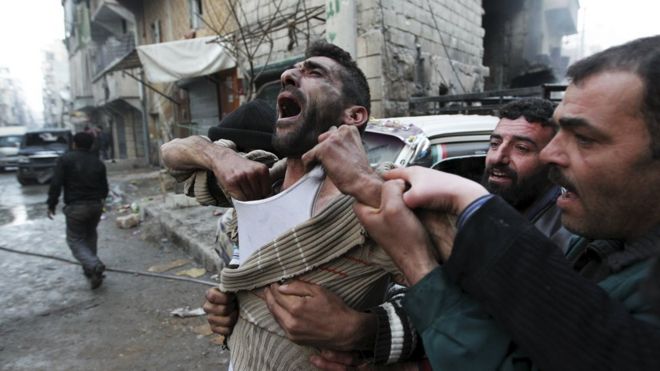 Image copyrightREUTERSSyria's war
Image copyrightREUTERSSyria's war
- Syria 'chemical attack': What we know
- Syria 'chemical attack': What can forensics tell us?
- Syria 'chemical attack': What now?
- The spectre of nerve agents in Syria - again
What began as a peaceful uprising against Syria's President Bashar al-Assad six years ago became a full-scale civil war that has left more than 300,000 people dead, devastated the country and drawn in global powers.
How did the war begin?
Long before the conflict began, many Syrians complained about high unemployment, widespread corruption, a lack of political freedom and state repression under President Bashar al-Assad, who succeeded his father, Hafez, in 2000.
In March 2011, pro-democracy demonstrations inspired by the Arab Spring erupted in the southern city of Deraa. The government's use of deadly force to crush the dissent soon triggered nationwide protests demanding the president's resignation.
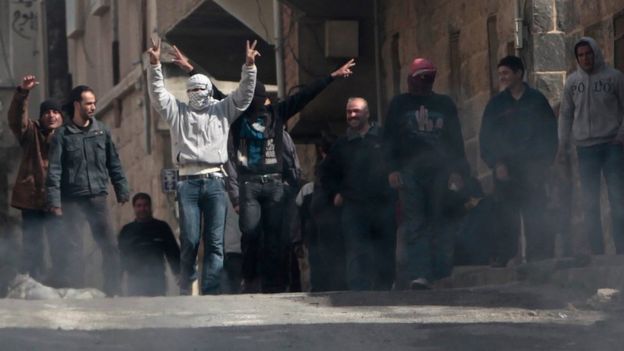 Image copyrightAPImage caption Protests in the southern city of Deraa in March 2011 were suppressed by security forces
Image copyrightAPImage caption Protests in the southern city of Deraa in March 2011 were suppressed by security forces
As the unrest spread, the crackdown intensified. Opposition supporters began to take up arms, first to defend themselves and later to expel security forces from their local areas. Mr Assad vowed to crush "foreign-backed terrorism" and restore state control.
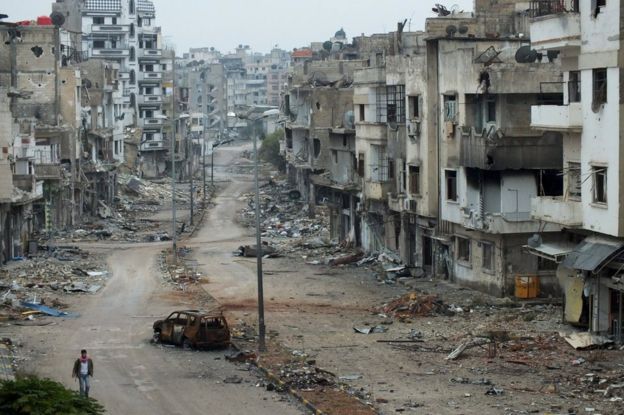 Image copyrightREUTERSImage captionThe city of Homs, dubbed "the capital of the revolution" suffered widespread destructionThe violence rapidly escalated and the country descended into civil war as hundreds of rebel brigades were formed to battle government forces for control of the country.
Image copyrightREUTERSImage captionThe city of Homs, dubbed "the capital of the revolution" suffered widespread destructionThe violence rapidly escalated and the country descended into civil war as hundreds of rebel brigades were formed to battle government forces for control of the country.
Why has the war lasted so long?
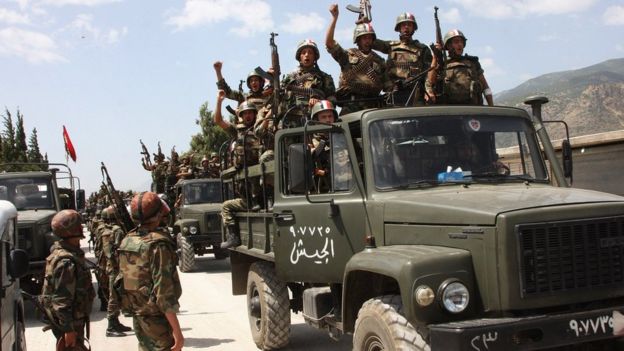 Image copyrightAPImage caption
Image copyrightAPImage caption
Government forces have lost control of large swathes of the country to various armed groups
In essence, it has become more than just a battle between those for or against Mr Assad.
A key factor has been the intervention of regional and world powers, including Iran, Russia, Saudi Arabia and the United States. Their military, financial and political support for the government and opposition has contributed directly to the intensification and continuation of the fighting, and turned Syria into a proxy battleground.
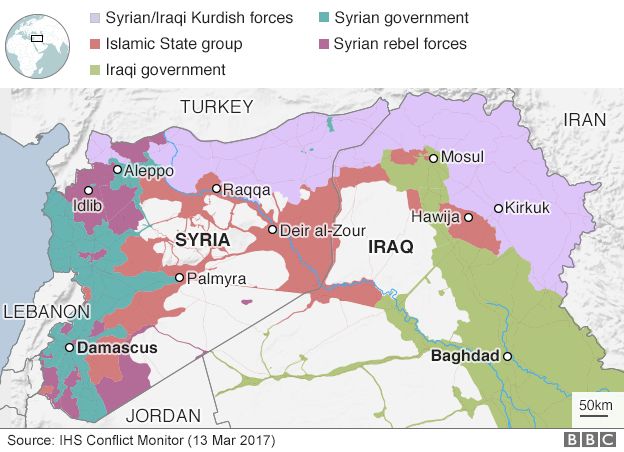
External powers have also been accused of fostering sectarianism in what was a broadly secular state, pitching the country's Sunni majority against the president's Shia Alawite sect. Such divisions have encouraged both sides to commit atrocities that have not only caused loss of life but also torn apart communities, hardened positions and dimmed hopes for a political settlement.
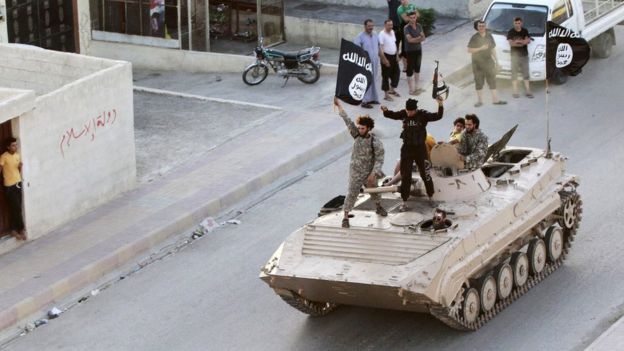 Image copyrightREUTERSImage caption
Image copyrightREUTERSImage caption
The northern Syrian city of Raqqa is the headquarters of the jihadist group Islamic State (IS)Jihadist groups have also seized on the divisions, and their rise has added a further dimension to the war. Hayat Tahrir al-Sham, an alliance formed by what was once the al-Qaeda-affiliated al-Nusra Front, controls large parts of the north-western province of Idlib.
Meanwhile, so-called Islamic State (IS), which controls large swathes of northern and eastern Syria, is battling government forces, rebel brigades and Kurdish militias, as well as facing air strikes by Russia and a US-led multinational coalition.
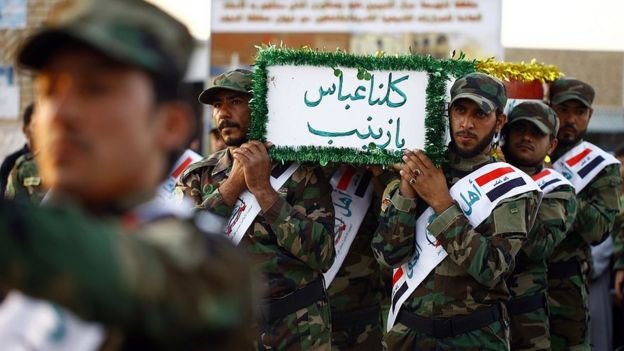 Image copyrightAFPImage captionThousands of Iranian-backed Shia militiamen are supporting Syrian government forcesThousands of Shia militiamen from Iran, Lebanon, Iraq, Afghanistan and Yemen say they are fighting alongside the Syrian army to protect holy sites.
Image copyrightAFPImage captionThousands of Iranian-backed Shia militiamen are supporting Syrian government forcesThousands of Shia militiamen from Iran, Lebanon, Iraq, Afghanistan and Yemen say they are fighting alongside the Syrian army to protect holy sites.
Why are so many outside powers involved?
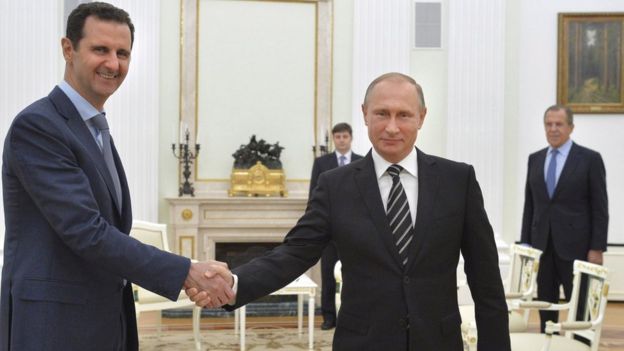 Image copyrightREUTERSImage caption
Image copyrightREUTERSImage caption
Russia's air campaign aimed to "stabilise" the government of President Bashar al-AssadRussia, for whom President Assad's survival is critical to maintaining its interests in Syria, launched an air campaign in September 2015 with the aim of "stabilising" the government after a series of defeats. Moscow stressed that it would target only "terrorists", but activists said its strikes mainly hit Western-backed rebel groups.
Six months later, having turned the tide of the war in his ally's favour, President Vladimir Putin ordered the "main part" of Russia's forces to withdraw, saying their mission had "on the whole" been accomplished. However, intense Russian air and missile strikes went on to play a major role in the government's siege of rebel-held eastern Aleppo, which fell in December 2016.
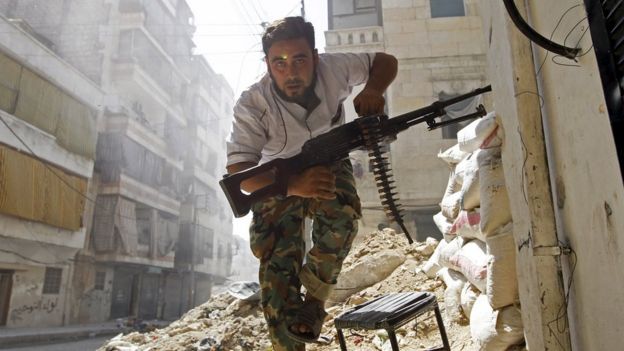 Image copyrightREUTERSImage caption
Image copyrightREUTERSImage caption
Rebels have received only limited military assistance from Western powersShia power Iran is believed to be spending billions of dollars a year to bolster the Alawite-dominated government, providing military advisers and subsidised weapons, as well as lines of credit and oil transfers. It is also widely reported to have deployed hundreds of combat troops in Syria.
Mr Assad is Iran's closest Arab ally and Syria is the main transit point for Iranian weapons shipments to the Lebanese Shia Islamist movement Hezbollah, which has sent thousands of fighters to support government forces.
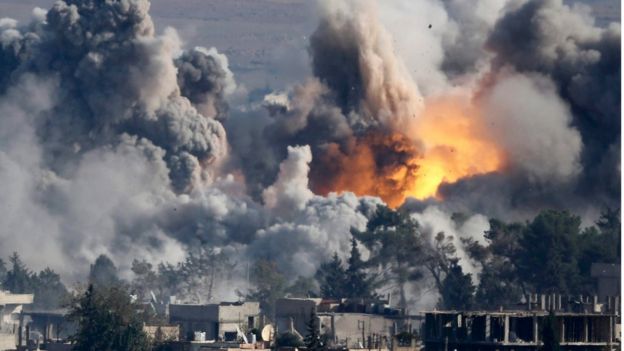 Image copyrightREUTERSImage caption
Image copyrightREUTERSImage caption
A US-led coalition has been conducting air strikes on Islamic State militants in Syria since 2014The US, which says President Assad is responsible for widespread atrocities, has provided only limited military assistance to "moderate" rebel groups, fearful that advanced weapons might end up in the hands of jihadists. The US has conducted air strikes on IS in Syria since September 2014, and, in the first intentional attack on Syria itself, hit an air base which it said was behind a deadly chemical attack, in April 2017.
Sunni-ruled Saudi Arabia, which is seeking to counter the influence of its rival Iran, has been a major provider of military and financial assistance to the rebels, including those with Islamist ideologies.
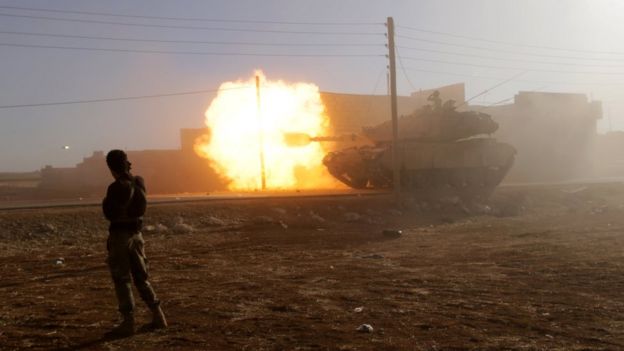 Image copyrightREUTERSImage caption
Image copyrightREUTERSImage caption
Turkish troops are backing a Syrian rebel offensive to take control of a northern border areaTurkey is another staunch supporter of the rebels. However, it has sought to contain the Kurdish Popular Protection Units (YPG) militia whose fighters are battling IS as part of the US-backed Syrian Democratic Forces (SDF) alliance. Ankara accuses the YPG of being an extension of the banned Turkish Kurdistan Workers' Party (PKK).
In August 2016, Turkish troops backed a rebel offensive to drive IS militants out of one of the last remaining stretches of the Syrian side of the border not controlled by the Kurds. Since then, they have taken control of some 2,000 sq km (772 sq miles) of territory, according to the Turkish military, and forced the US to deploy troops to the SDF-controlled town of Manbij to prevent clashes.
What impact has the war had?
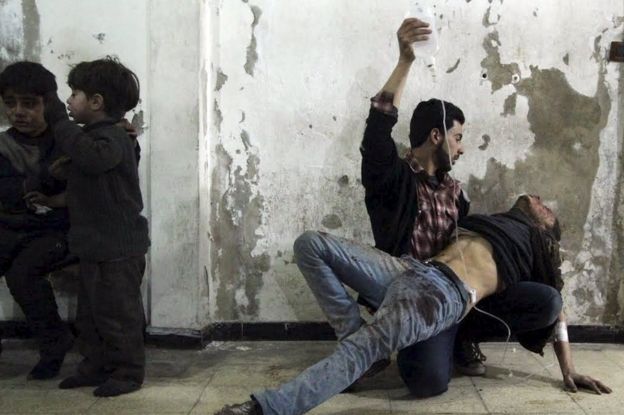 Image copyrightREUTERSImage caption
Image copyrightREUTERSImage caption
There are no reliably accurate statistics on the number of people killed or wounded in the fightingThe UN says at least 250,000 people have been killed in the past five years. However, the organisation stopped updating its figures in August 2015. The Syrian Observatory for Human Rights, a UK-based monitoring group, puts the death toll at more than 321,000, while a think-tank estimated in February 2016 that the conflict had caused 470,000 deaths, either directly or indirectly.
Five million people - most of them women and children - have fled Syria, according to the UN. Neighbouring Lebanon, Jordan and Turkey have struggled to cope with one of the largest refugee exoduses in recent history.
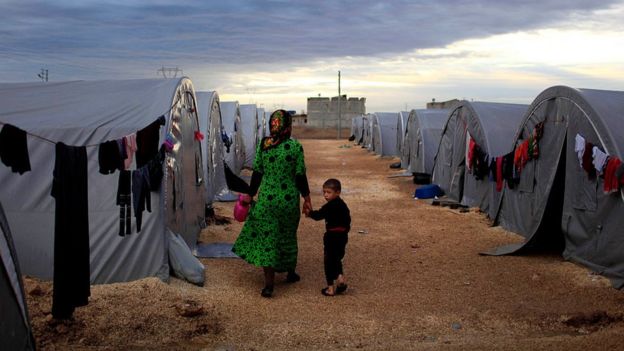 Image copyrightGETTY IMAGES
Image copyrightGETTY IMAGES
About 10% of Syrian refugees have sought safety in Europe, sowing political divisions as countries argue over sharing the burden. A further 6.3 million people are internally displaced inside Syria.
The UN estimates it will need $3.4bn (£2.7bn) to help the 13.5 million people who will require some form of humanitarian assistance inside Syria in 2017.
Almost 85% of Syrians live in poverty, with more than two-thirds of the population in either extreme or abject poverty. More than 12.8 million people in Syria require health assistance and more than seven million are food insecure amid rising prices and food shortages. Households spend up to a quarter of their income just on water. Some 1.75 million children are out of school.
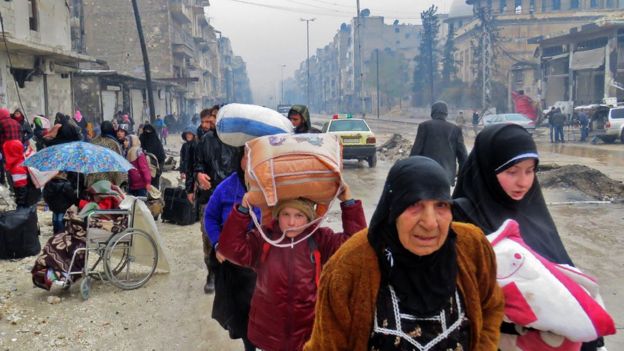 Image copyrightAFPImage caption
Image copyrightAFPImage caption
Almost half of Syria's pre-war population of 23 million has been displaced by the war
The warring parties have compounded the problems by refusing humanitarian agencies access to many of those in need. Some 4.9 million people live in besieged or hard-to-reach areas.
What's being done to end the conflict?
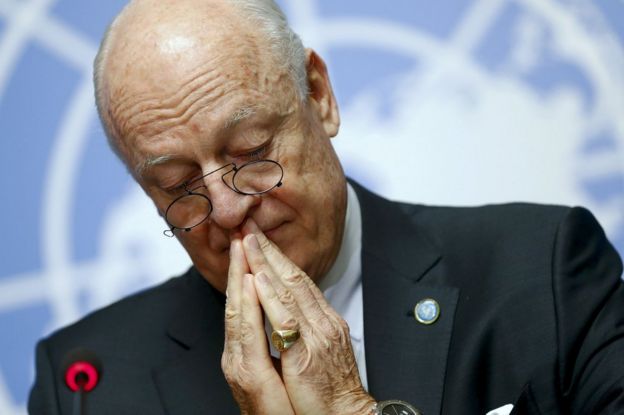 Image copyrightREUTERSImage caption
Image copyrightREUTERSImage caption
Previous attempts by the UN to broker a political settlement have failedWith neither side able to inflict a decisive defeat on the other, the international community long ago concluded that only a political solution could end the conflict. The UN Security Council has called for the implementation of the 2012 Geneva Communique, which envisages a transitional governing body with full executive powers "formed on the basis of mutual consent".
Peace talks in early 2014, known as Geneva II, broke down after only two rounds, with the UN blaming the Syrian government's refusal to discuss opposition demands.
A year later, the conflict with IS lent fresh impetus to the search for a political solution in Syria. The US and Russia persuaded representatives of the warring parties to attend "proximity talks" in Geneva in January 2016 to discuss a Security Council-endorsed road map for peace, including a ceasefire and a transitional period ending with elections.
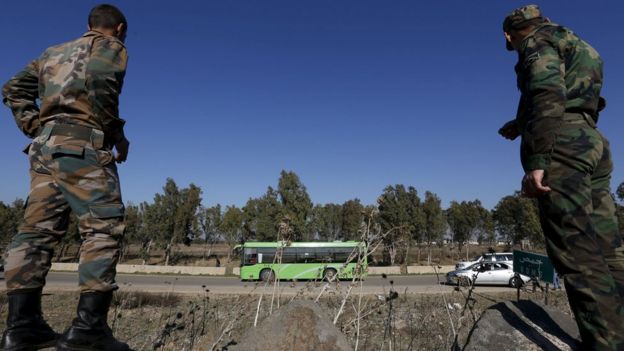 Image copyrightREUTERSImage caption
Image copyrightREUTERSImage caption
A local truce in the Homs suburb of al-Wair in December 2015 allowed rebels to be evacuated
The first round broke down while still in the "preparatory" phase, as government forces launched an offensive around Aleppo. The talks resumed in March 2016, after the US and Russia brokered a nationwide "cessation of hostilities" that excluded jihadist groups. But they collapsed the following month.
Turkey and Russia brokered another truce after the fall of Aleppo. In January 2017, they and Kazakhstan hosted the first face-to-face meeting between rebel fighters and government officials since the war began. That was followed by a fresh round of UN-mediated talks in Geneva, which UN envoy Staffan de Mistura said"achieved much more than many people had imagined we could have".
What is left of rebel territory?
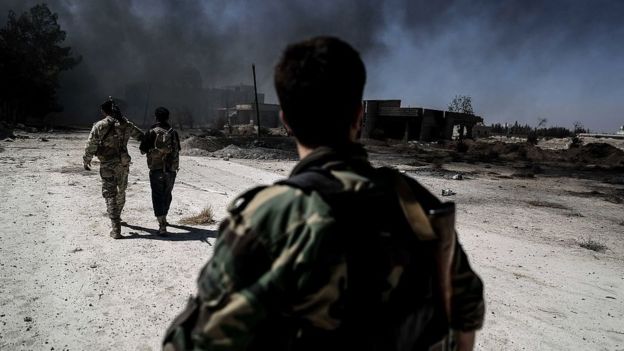 Image copyrightAFPImage caption
Image copyrightAFPImage caption
Several opposition-held districts and suburbs of Damascus are under siege
The fall of Aleppo means the government now controls Syria's four biggest cities. But large parts of the country are still held by other armed groups.
Rebel fighters and allied jihadists are estimated to control about 15% of Syrian territory, according to the Syrian Observatory for Human Rights.
US officials said in early December 2016 that there were 50,000 or more "moderate" rebels, concentrated in the north-western province of Idlib and the western Aleppo countryside.
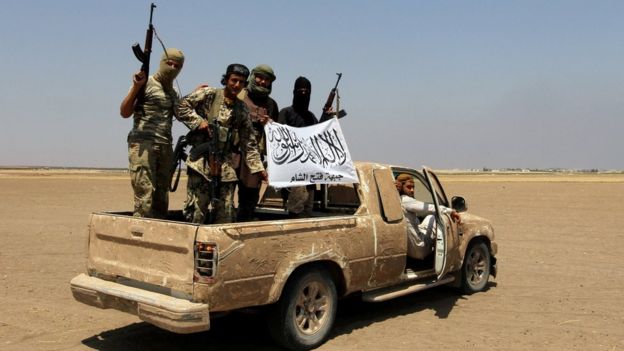 Image copyrightREUTERSImage caption
Image copyrightREUTERSImage caption
Al-Qaeda-linked jihadists are a key part of the rebel alliance controlling Idlib provinceRebels also control smaller areas in the central province of Homs, the southern provinces of Deraa and Quneitra, and the eastern Ghouta agricultural belt outside Damascus.
Kurdish forces, who say they support neither the government nor the opposition, meanwhile control much of Syria's border with Turkey, as well as a large part of the country's north-east.
And although they have suffered extensive losses in the past two years, IS militants still hold large parts of central and northern Syria, including the city of Raqqa.
http://www.bbc.com/news/world-middle-east-35806229
NO AMNESTY
Don't reward the criminal actions of millions of illegal aliens by giving them citizenship.
Sign in and post comments here.
Please support our fight against illegal immigration by joining ALIPAC's email alerts here https://eepurl.com/cktGTn
-
04-11-2017, 06:27 PM #16Senior Member

- Join Date
- Mar 2006
- Posts
- 7,377
You know, I'm beginning to think no one knows who's fighting what or where or why
A lot of people just want to keep war going - lots of money in war.
-
04-11-2017, 06:45 PM #17Senior Member

- Join Date
- Jan 2012
- Posts
- 1,150
If you can't see that the problem is that Islam is on the march, then you are not paying enough attention to merit worrying about it. Muslims want the world for themselves and the way to that is consolidating the Middle East under a single block of power, a caliphate. This was the mission of Al Qaeda from its very beginning. And this is what ISIS is, it the corner stone of what Muslims see as a global caliphate, a Muslim empire that spans the globe.
They are not kidding. Every terrorist attack in every part of the world by every Muslim terrorist is motivated based on this object.Support ALIPAC'sFIGHT AGAINST illegal immigration & Amnesty by joining our E-mail Alerts at http://eepurl.com/cktGTn
Similar Threads
-
The evidence of Syrian chemical weapons attack
By JohnDoe2 in forum General DiscussionReplies: 0Last Post: 09-04-2013, 02:47 PM -
Syrian government behind 'massive chemical attack' BBC
By JohnDoe2 in forum General DiscussionReplies: 1Last Post: 09-02-2013, 06:51 PM -
AP Reporter: Syrian Rebels behind Chemical attack!
By AirborneSapper7 in forum General DiscussionReplies: 1Last Post: 09-01-2013, 10:35 AM -
What The Media Isnít Telling You About The Syrian Chemical Attack
By HAPPY2BME in forum General DiscussionReplies: 0Last Post: 08-27-2013, 11:47 PM -
What The Media Isnít Telling You About The Syrian Chemical Attack
By Reciprocity in forum Other Topics News and IssuesReplies: 2Last Post: 08-26-2013, 07:23 PM


 10Likes
10Likes LinkBack URL
LinkBack URL About LinkBacks
About LinkBacks





 Reply With Quote
Reply With Quote


Oklahoma House passes bill making illegal immigration a state...
04-19-2024, 05:14 AM in illegal immigration News Stories & Reports